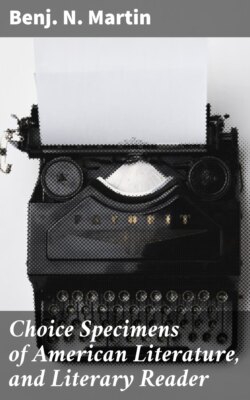Читать книгу Choice Specimens of American Literature, and Literary Reader - Benj. N. Martin - Страница 84
На сайте Литреса книга снята с продажи.
=54.= THE PIONEER PREACHERS OF THE MISSISSIPPI VALLEY.
ОглавлениеThe spoken eloquence of New England is for the most part from manuscript. Her first settlers brought old-world forms, and fashions from the old world, with them. Their preachers were set an appalling distance from their congregations. Between the pulpit, perched far up toward the ceiling, and the seats, was an awful abysmal depth. Above the lofty desk was dimly seen the white cravat, and above that the head of the preacher. His eye was averted and fastened downward upon his manuscript, and his discourse, or exercitation, or whatever it might be, was delivered in a monotonous, regular cadence, probably relieved from time to time by some quaint blunder, the result of indistinct penmanship, or dim religious light. It was not this preacher's business to arouse his audience. The theory of worship of the period was opposed to that. This people did not wish excitement, or stimulus, or astonishment, or agitation. They simply desired information; they wished to be instructed; to have their judgment informed, or their reason enlightened. Thus the preacher might safely remain perched up in his far distant unimpassioned eyrie.
But how would such a style of eloquence—if, indeed, truth will permit the name of eloquence to be applied to the reading of matter from a preconcerted manuscript—how would such a style of delivery be received out in the wild West? Place your textual speaker out in the backwoods, on the stump, where a surging tide of humanity streams strongly around him, where the people press up toward him on every side, their keen eyes intently perusing his to see if he be in real earnest—"dead in earnest"—and where, as with a thousand darts, their contemptuous scorn would pierce him through if he were found playing a false game, trying to pump up tears by mere acting, or arousing an excitement without feeling it. Would such a style of oratory succeed there? By no means. The place is different; the hearers are different; the time, the thing required, all the circumstances, are totally different. Here, in the vast unwalled church of nature, with the leafy tree-tops for a ceiling, their massy stems for columns; with the endless mysterious cadences of the forest for a choir; with the distant or nearer music and murmur of streams, and the ever-returning voice of birds, sounding in their ears for the made-up music of a picked band of exclusive singers: here stand men whose ears are trained to catch the faintest foot-fall of the distant deer, or the rustle of their antlers against branch or bough of the forest track—whose eyes are skilled to discern the trail of savages who leave scarce a track behind them; and who will follow upon that trail—utterly invisible to the untrained eye—as surely as a blood-hound follows the scent, ten or twenty, or a hundred miles, whose eye and hand are so well practised that they can drive a nail, or snuff a candle, with the long, heavy western rifle. Such men, educated for years, or even generations, in that hard school of necessity, where every one's hand and wood-man's skill must keep his head; where incessant pressing necessities required ever a prompt and sufficient answer in deeds; and where words needed to be but few, and those the plainest and directest, required no delay nor preparation, nor oratorical coquetting, nor elaborate preliminary scribble; no hesitation nor doubts in deeds; no circumlocution in words. To restrain, influence, direct, govern, such a surging sea of life as this, required something very different from a written address.
[Footnote 20: Born in Philadelphia; a Methodist divine, long afflicted with blindness; but widely popular as a preacher and lecturer.]
* * * * *
